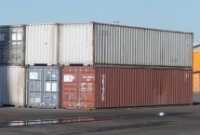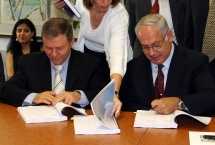Minister of Finance, Benjamin Netanyahu, and Minister of Transport, Meir Sheetrit, signed a franchise agreement with Carmelton Ltd. today, for the financing, construction, and operation of the Carmel Tunnels Project, under the BOT method.
The Minister of Finance stated: “After long years of bureaucratic entanglements we can finally see the light at the end of the tunnel. We set our sights on cutting through the red tape and assisting both foreign and local developers as much as possible, encouraging their investments in Israeli projects. This is what we have done. Over the last two years, we have been promoting infrastructure projects, totaling some NIS 45 billion, including development of the Israeli Railways, light rail projects in Tel Aviv and Jerusalem, construction of infrastructure for natural gas, signing a concession for the construction of Highway 431, issuing a tender for creating a high-speed lane for accessing Tel Aviv, desalination facilities, and others.”
The Minister of Transport stated: “Full cooperation exists between the Ministry of Finance and the Accountant General’s Office, on the one hand, and the Ministry of Transport, on the other, to push ahead with a wide swathe of infrastructure projects, many of them carried out in conjunction with the private sector. The Carmel Tunnels Project serves as an example of this cooperation and illustrates an investment with the highest return available. By employing the PFI or BOT methods, rapid implementation at a superior price is assured.” Minister Sheetrit added that thanks to this policy initiative by the Ministries of Finance and Transport, the business environment in the country has been transformed and confidence between the public and private sectors has been restored.
The cost of constructing the project totals approximately NIS 1 billion (to be paid for by the concessionaire). The concessionaire will also pay the state NIS 266 million in royalties and, pursuant to the contract, beyond a certain level of revenues, will also convey to the state a percentage of the profits ranging from 15% to 70%, depending on the extent of revenues. Construction of the road will begin in April 2006, and the road is expected to be operational in 2010.
The agreement that was signed has two advantages from the state’s point of view: (1) During the course of the negotiations, the state managed to lower the toll to be charged for using the tunnels by about 50%; (2) If the project lives up to expectations, in terms of demand, or even below expectations, the state will be paid part of the profits that accrue to the developer. On top of these advantages, the project carries economic benefits estimated to total hundreds of millions of shekels per annum.
In 1996, the State of Israel issued a tender for construction of the Carmel Tunnels, under the BOT method. As part of the project, the concessionaire was to construct four tunnels in the Carmel Mountains, provide maintenance for them, operate them, charge a toll for their use, and 35 years later – transfer ownership of the tunnels to the state. The concession was secured in 1997 by a group headed by Carmelton Ltd., which included Ashtrom, the Spanish firm Dragados, Property & Development, and FIBI. In 1999,the group had already secured financing from Discount Bank and was about to begin its construction operations, although the construction ultimately never began. Owing to the delay in carrying out the project, Dragados, Property & Development and FIBI decided to pull out of the project and were replaced by Housing & Construction Holding Company Ltd.
Carmel Tunnels Project underway
Minister of Finance, Benjamin Netanyahu, and Minister of Transport, Meir Sheetrit, signed a franchise agreement with Carmelton Ltd. today, for the financing, construction, and operation of the Carmel Tunnels Project, under the BOT method
01.08.05 / 00:00
•
More articles that may interest you

FICC calls for correct economic disengagement from Gaza strip

Ministers approved Israel Ports' NIS 1.76b development budget

High-tech cooperation agreement signed between Dalian, China and Israel
Economic cooperation agreement signed with the Ukraine
Bank of Israel research department: State of Economy index down by 0.1% in June

Ministry of industry & trade : China, India, and South Korea are export targets
More news from Land Transport Section
>New terminal at Sheikh Hussein bridge border opened/11.07.05
>Winner selected in tender for construction of Highway 431 connecting Rishon LeZion to Modi'in/25.04.05
>2004 - Transportation infrastructure investment down 14%/18.04.05
>Israel Railways inaugurated the Tel Aviv-Jerusalem and Tel Aviv-Ashkelon lines/11.04.05
>Transportation infrastructure investment slows down/03.04.05
>Diesel fuel tax was raised on 1st January/03.01.05
>Karni border crossing – round the clock operation ?/06.12.04
>Karni crossing closed again/04.10.04
>Eilat railway by 2008/20.09.04
>Fruit growers claim compensation due to closure of Karni terminal/16.08.04
